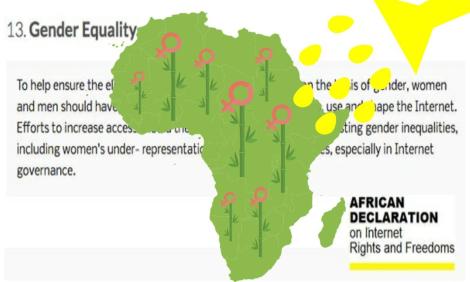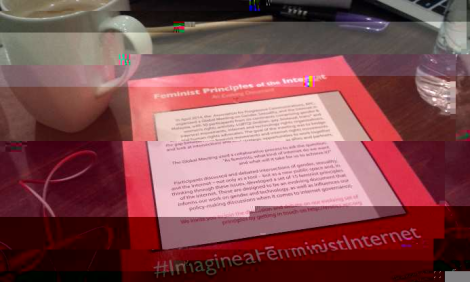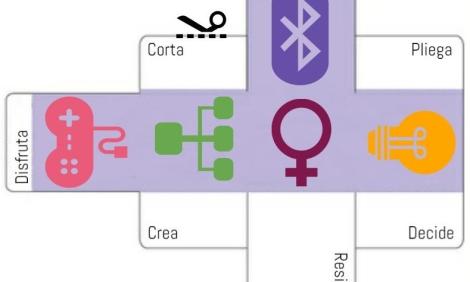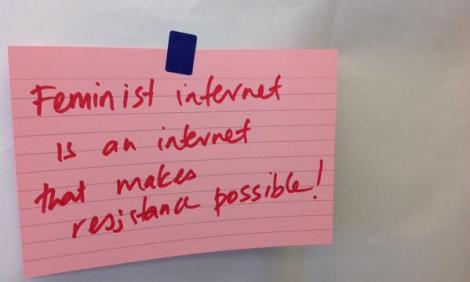
In depth
Feminism online in West and Central Africa: Identities and digital colonisation
This article examines the challenges that women's rights and sexual rights activists face in online feminist organising and participation in internet governance decision-making processes in West and Central Africa. It focuses particularly on linguistic barriers, and the expression of sexual or gender non-conforming identities in a context of digital colonisation in the sub-region.

Editorial
[EDITORIAL] Feminist Principles of the Internet: Two years later
Two years after
the initial birth of the Feminist Principles of the Internet, Dhyta helps us frame this edition where we see how feminists put the principles into practice in their own contexts. “As an evolving document, we need to constantly revisit it to make sure that it stays relevant, or else we should clarify, revise or even change it in accordance with the new circumstances and our needs…

Three key issues for a feminist internet: Access, agency and movements
The Feminist Principles of the Internet arose from the first Imagine a Feminist Internet meeting in 2014 in Malaysia. The meeting brought together 52 women's rights, sexual rights and internet rights activists from six continents to discuss one question: "As feminists, what kind of internet do we want, and what will it take for us to achieve it?" The principles cover the topics of access, agency…

In depth
The Do-It-Yourself Feminist Internet: Cyber feminist actions from Latin America
Informed by resistance, dissident identities, intersectional approaches, issues of sexuality and universal access to the internet, we seek a collective answer to the question: Is a feminist internet possible? This reflection is a joint undertaking with Latin American women activists advocating freer and more equitable technologies and working to saturate the net with feminist content and…

In depth
Deep Lab creative inquiry: Interview with Addie Wagenknecht
Recently, Addie Wagenknecht, the Frank-Ratchye STUDIO for Creative Inquire Fellow, organised a congress of cyberfeminist researchers to examine how themes of privacy, security, surveillance, anonymity, and large-scale data aggregation are problematised in the arts, culture and society. In the following interview, Lamia Kosovic speaks to Addie about Deep Lab's initial research, the congress,…

Feminist talk
Imagine a feminist internet: Participation and political movements
What does a feminist approach to the internet mean? What difference does approaching the internet as a feminist make? How is our political activity changed by cyber activism? While meditating on political participation at the hashtag #imagineafeministinternet, Florencia Goldsman shares some thoughts about these constructs in progress.

Publication
ICTs for Feminist Movement Building: Activist Toolkit
This toolkit aims to assist activists to think through their communication strategies in a way that supports movement building. It offers a practical guide to writing a communication strategy and reviews a number of tools (ICTs) and technology-related campaigns which can be used in organising work.

Pulling apart the patriarchy: Edition in commemoration of Heike Jensen
News of Heike Jensen’s death from cancer, on 3 February 2014, reached internet governance academic and civil society networks a year later. As Marianne Franklin, friend and colleague from GigaNet, puts it: “The networks and the hands-on work in which Heike engaged are cross-border, cross-sector and interdisciplinary by nature and predilection. This is why news of her death has been a ripple of…

Publication
From the streets to the web: Looking at feminist activism on social media
Does social media enable forming networks of solidarity between different marginalised groups? Is there a space for non-normative discourses such as the discourse on pleasure? Does digital technology aid in the construction of feminist counter-publics? These are some of the questions explored in this paper. Power relations that operate through social media, including forms of gendered and…

In depth
Becoming an agent of change
Are feminists bored with online activism? Cyber feminists’ minor politics and affirmative political approach often presents us with dynamic, thematic and changeable maps of affinities, of political kinship, and there is a strong potential in the crafting of such unities. However, there are more than just a few obstacles that feminists in the virtual communities have to deal with. “But their…




